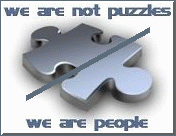



|
For Immediate Release [first published on March 10, 2009] The League to Fight Neurelitism, as a public sociology and an advocacy journalism project, actively promotes the conscientious application of United Nations values on human rights and social justice to each and every autistic individual. The concept of standpoint epistemologies, or ways of knowing from particular perspectives (situated knowledge), was developed by feminist intellectuals as a means of exploring the relative impacts of social constructions of gender on the production of knowledge. Most current feminist approaches to this subject attempt to avoid reification, the attribution of an objective existence to abstract concepts, by not essentializing gender categories or, in other words, by not treating them as real or fixed entities. A feminist standpoint epistemology, when consciously applied to social action, becomes feminist praxis; which is to say that a feminist standpoint epistemology makes such praxis possible. The Greek word praxis, from which we obtain the more commonplace, practice, is a standard academic term for the concrete utilization of knowledge, theory, or philosophy. It expresses the idea of the scholar-practitioner, the value-laden scholar as distinguished from the supposedly value-free one. Emi Koyama, an activist concerned with intersexuality and other issues, directs the Intersex Initiative. On her personal website, in responding to the question, "How can Emi claim to be able to speak about so many different issues?," she eloquently explains: For one thing, Emi happens to have been impacted by each of these issues personally, and participated in many different activisms. But that's not the complete answer: the full answer is that Emi believes that one's activist orientation should not be about which issues she or he wants to tackle, but what approach she or he would take to any social issues. For this reason, Emi is resisting being pigeonholed into being an "intersex activist," for example. In like manner, The League to Fight Neurelitism believes that the epistemic standpoint one takes to an anti-neurelitist autistic activism, or praxis, is primary. To that end, various epistemic standpoints are possible, including the orientation of a reflexive sociology, the posture of a non-violent resistor, the peace testimony of a Quaker, the stance of a advocacy journalist, an existential position, the ethical Jewish philosophy of tikkun olam (repairing the world), an Islamic jihad bil yad (struggle by the hand) to fight economic and social injustices, the personal construct psychology perspective within psychological constructivism, a theistic viewpoint as liberation theology, the outlook of an engaged Buddhism, etc. To illustrate, the League director has adopted, within the context of the public sociology movement, what is termed new critical theory (also known as postmodern critical theory and resembling, but not identical to, critical postmodernism and post-Marxism). This perspective focuses, in part, on analyzing the relations between social texts or narratives, namely, the stories used to legitimize truth claims, and on considering the manners in which relatively high-status individuals impose those narratives, through the exercise of their power and dominance, on one or more publics. An example of new critical theory would be the construction of the war on terror, in the post-9/11 period, and the associations made between rejecting "it" and being "with the terrorists." Similarly, neurelitist accounts, including those which emphasize curing autistics rather than supporting them, can be examined, critiqued, and deconstructed. The director has also applied this perspective, from a spiritual standpoint, within his ASMÁ Learning Communities™ and, sociologically, within his Institute for Emancipatory Constructionism™. Respectfully submitted,
Mark A. Foster, Ph.D. -30- |
